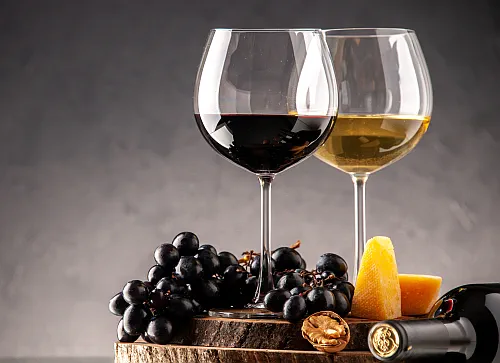Wine in Cocktails: A Symphony of Flavors
Wine, a versatile and cherished beverage, holds a special place in the world of cocktails. Its use in cocktail crafting brings a range of benefits: diverse flavors, varying levels of acidity, natural aromas, and a generally lower alcohol content compared to spirits. Wine can serve as the primary ingredient or play a complementary role alongside other spirits, offering a spectrum of possibilities for cocktail enthusiasts.
Diverse Types of Wines in Cocktails
Sparkling Wine: Known for its effervescence, it adds a lively touch to cocktails. Champagne, from France, is the most renowned, but other varieties like Spanish Cava and Italian Prosecco also offer delightful alternatives. The dryness of sparkling wine can vary, with brut being very dry and doux being sweeter. For most Champagne cocktails, a dry variety is preferred to balance the sweetness of other ingredients.
Sherry: This fortified wine from Spain’s Jerez region comes in various styles. Lighter versions like Fino and Manzanilla are crisp and salty, while Amontillado and Oloroso offer deeper flavors of dried fruits and nuts due to extended oxidation. When a cocktail recipe calls for sherry and doesn’t specify the type, dry sherry is usually a safe bet.
Vermouth: A fortified wine flavored with wormwood and other herbs and spices, vermouth comes in several styles, including dry, sweet (or red), blanc (white), rosé, and Rosato. Dry vermouth is a classic ingredient in martinis, while sweet vermouth is a key component in Manhattans. Bianco and Blanc vermouths are slightly sweeter than dry vermouths, and rosé and Rosato vermouths offer a pink hue with a subtly spicy flavor.
Brandy: Distilled from fermented fruit mash, brandy varieties like Cognac, Armagnac, and Calvados are popular in cocktails. Cognac and Armagnac are grapes from France, while Calvados is an apple (and sometimes pear) brandy from Normandy. Brandy must be distilled at less than 190 proof and bottled at more than 80 proof.
Pisco: A grape brandy from the wine regions of Chile and Peru, Pisco is at the heart of the classic Pisco Sour cocktail. Unlike French brandies, Pisco is not barrel-aged, resulting in a clear appearance. The debate between Chile and Peru over the ownership of Pisco is a testament to its cultural significance in both countries.
Wine in Cocktails: A Creative Canvas
The use of wine in cocktails opens up a world of creativity and experimentation. From the enthusiasm for sparkling wines to the rich complexity of fortified wines, each type brings unique characteristics to the mix. Whether a light and refreshing aperitif or a robust after-dinner drink, wine-based cocktails offer a delightful experience that caters to a wide range of palates and occasions. As the cocktail culture continues to evolve, the integration of wine into this realm underscores its timeless appeal and versatility.
The Most Known Cocktails, Including Wine
SPARKLING WHITE WINE: Champagne Cocktail, Tropical Mimosa, Bellini, 22 Punch, Clementine 75, Golden Spritz, Rosie’s Return, and Sonoma.
PORT & SHERRY: Brunch on the Danube, Four on the Floor, The Doubting Duck, and Tangled Up.
VERMOUTH: Hagar the Gentle, Americano, and Normandie Club Spritz.
BRANDY: Brandy Crusta, Sidecar, Vieux Carré, Brandy Alexander, Jack Rose, Flashbang, Frenched Hot Chocolate, PCM, Pisco Sour, and Frozen Tea-Sco Sour.
Did you know about the Wines?
- Ancient Beverage: Wine is one of the oldest known alcoholic beverages, with evidence of its production dating back to 6000 BC in Georgia and 7000 BC in China.
- A Symbol of Civilization: In ancient Greece, wine was considered a symbol of civilization and was closely associated with the gods, particularly Dionysus, the god of wine and festivity.
- Birthplace of Champagne: The Champagne region of France, renowned for its sparkling wine, actually discovered the champagne-making process by accident. The cold winters halted fermentation, restarting in the spring, creating natural carbonation in the wine.
- The World’s Oldest Winery: Archaeologists discovered what is believed to be the world’s oldest winery in Armenia, estimated to be over 6,000 years old.
- Health Benefits: Moderate wine consumption has been associated with various health benefits, including reduced risk of heart disease and certain cancers, largely attributed to antioxidants like resveratrol found in red wine.
- A Diverse World of Grapes: There are over 10,000 varieties of wine grapes worldwide, but only a few dozen have achieved international recognition, such as Cabernet Sauvignon, Chardonnay, and Merlot.
- The Judgement of Paris: In 1976, a wine-tasting event dramatically changed the wine world when California wines were rated higher than French wines, breaking the European dominance in the wine industry.
- Wine in Space: Wine has even traveled to space; a French wine company sent 12 bottles of Bordeaux to the International Space Station in 2019 to study the effects of space travel on wine aging.
- The Largest Wine Consumers: Contrary to popular belief, Vatican City has the world’s highest wine consumption per capita, not France or Italy.
- Fortified Wine’s Naval Roots: Fortified wines like Port and Sherry were developed to survive long sea voyages during the Age of Exploration, with their high alcohol content acting as a preservative.
In conclusion, wine is not just a beverage; it’s a tapestry woven through human history, culture, and innovation. From its ancient origins to its revered status in modern gastronomy and mixology, wine has evolved to become a symbol of sophistication, celebration, and human connection. Each variety of wine, from the effervescent bubbles of Champagne to the deep complexities of a vintage Port, tells a unique story of its terroir, its makers, and the time-honored traditions passed down through generations. Whether enjoyed in a quiet moment of solitude, a lively gathering with friends, or as a key ingredient in a crafted cocktail, wine continues to enchant and delight connoisseurs and casual drinkers alike. Its rich history, diverse styles, and the joy it brings to tables around the world affirm wine’s enduring legacy as one of the most cherished and versatile creations of mankind.

